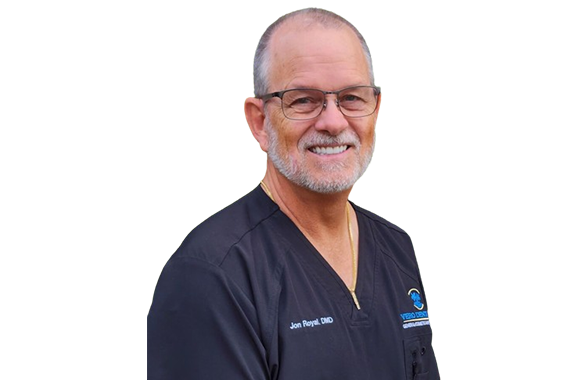What Is TMJ Ankylosis?
Temporomandibular joint (TMJ) ankylosis is a medical condition that involves the fusion or immobilization of the temporomandibular joint, which is the joint that connects your jawbone (mandible) to your skull. This joint allows you to perform various movements of the jaw, including talking, chewing, and yawning. When ankylosis occurs, it restricts or prevents the normal movement of the jaw due to bony or fibrous adhesion of the anatomic joint components, leading to significant functional and sometimes cosmetic problems, such as difficulties in mastication, speech, and oral hygiene.
If you’re dealing with chronic jaw pain, contact our dentist in Vero Beach today to schedule a temporomandibular joint evaluation. Call us at (772) 778-5550 to get started.
Types of TMJ Ankylosis
There are various temporomandibular joint ankylosis types that patients may develop, including:
- Traumatic Temporomandibular Joint Ankylosis: This is the most common type of TMJ ankylosis and occurs as a result of trauma or injury to the jaw joint. Fractures, dislocations, or severe blows to the joint can lead to the formation of scar tissue, which eventually fuses the joint. The implications of traumatic temporomandibular joint ankylosis include joint fusion, the need for accurate diagnosis, classification, and various surgical management options to address the long-term effects on patient mobility and health.
- Infection-Related Ankylosis: Infections in the temporomandibular joint area, such as osteomyelitis or septic arthritis, can lead to inflammation and tissue damage in the joint. If left untreated, this can result in ankylosis.
- Rheumatoid Ankylosis: Rheumatoid arthritis can affect the TMJ. Chronic inflammation in the joint can lead to the development of ankylosis over time.
- Congenital Ankylosis: Some individuals are born with congenital anomalies or abnormalities in the TMJ, which can predispose them to develop ankylosis later in life.
- Fibrous Ankylosis: This type of ankylosis occurs when fibrous tissue forms within the joint, restricting its movement. It can be due to various causes, including trauma or inflammation.
- Bony Ankylosis: In bony ankylosis, the actual bone of the jaw fuses with the skull bone, preventing any movement of the joint. This is a severe form of ankylosis and often requires surgical intervention.
- Myofibroblastic Ankylosis: This type of ankylosis is characterized by the presence of myofibroblasts, which are contractile cells involved in wound healing, within the joint. Myofibroblasts can cause the joint to become stiff and immobile.
- Fibro-Osseous Ankylosis: Fibro-osseous ankylosis involves the formation of both fibrous tissue and bone within the joint, leading to reduced mobility.
Causes of TMJ Ankylosis
TMJ ankylosis can occur due to multiple factors, such as:
- Jaw Trauma: A common cause of TMJ ankylosis, trauma, or injury to the jaw or face can occur due to various factors, such as a car accident, sports injury, or a fall. Any injury that affects the temporomandibular joint can cause inflammation and scarring, which can lead to the joint becoming stiff or fused.
- Infection of the TMJ: Infection can lead to inflammation in the joint, which can cause the formation of scar tissue. Over time, the scar tissue can cause the joint to become stiff or fused.
- Genetic Factors: Some people may be predisposed to developing TMJ ankylosis due to genetics.
- Rheumatoid Arthritis: An autoimmune condition that causes joint inflammation, including the temporomandibular joint. Over time, this inflammation can create scar tissue, causing the joint to become stiff or fused.
- Poor Oral Hygiene: Poor oral hygiene can lead to infections in the mouth. Infections can spread to the temporomandibular joint and cause inflammation and scarring.
TMJ Ankylosis Symptoms
The symptoms of temporomandibular joint ankylosis may vary from person to person. Some of the common symptoms are:
- Pain and discomfort in the jaw joint
- Stiffness or limited movement of the jaw
- Difficulty in opening or closing the mouth
- Clicking or popping sound while opening or closing the mouth
- Headaches
- Earaches
- Facial swelling
A comprehensive evaluation, including a clinical examination, is crucial for accurately diagnosing TMJ ankylosis and planning appropriate surgical interventions.
Who Can Develop TMJ Ankylosis?
TMJ ankylosis can develop in individuals of all ages, from children to adults, and it can affect both men and women. While it’s a relatively rare condition, there are several factors and risk factors that can increase the likelihood of developing TMJ ankylosis.
These factors include:
- Trauma: A history of trauma or injury to the jaw, particularly if the injury affects the temporomandibular joint, is a significant risk factor. Fractures or dislocations of the jaw can lead to the development of scar tissue and ankylosis.
- Infection: Infections in the temporomandibular joint area, such as tuberculosis or osteomyelitis, can cause inflammation and damage to the joint, increasing the risk of ankylosis.
- Inflammatory disorders: Conditions like rheumatoid arthritis, ankylosing spondylitis, and other autoimmune or inflammatory disorders can affect the TMJ and increase the likelihood of ankylosis.
- Congenital factors: Some individuals may be born with structural abnormalities or genetic predispositions that make them more susceptible to temporomandibular joint problems, including ankylosis.
- Prior surgery or dental procedures: Surgical procedures or dental work involving the TMJ can sometimes lead to complications that result in ankylosis.
- Poorly treated or neglected TMJ conditions: Chronic or untreated TMJ disorders, such as temporomandibular joint dysfunction (TMD), can potentially lead to joint damage and ankylosis if left unmanaged over an extended period.
Treatment of TMJ Ankylosis
Medications
Pain relievers, anti-inflammatory drugs, and muscle relaxants may be prescribed to relieve pain and inflammation in the jaw joint. Antibiotics may be given to prevent or treat any infections that may occur during or after surgery.
Oral and Maxillofacial Surgery
Various surgical techniques may be recommended for temporomandibular joint ankylosis, including:
- Release of Ankylosis: The primary goal of surgery is to release the fused joint and restore jaw movement. This procedure is often called a “release of ankylosis.” During the surgery, the surgeon removes the bony or fibrous tissue that has caused the fusion and restores mobility to the joint.
- Gap Arthroplasty: Gap arthroplasty is a surgical technique that creates a gap between the bones in the joint. This gap allows for the formation of a new joint, and it is often followed by physical therapy to encourage proper jaw movement.
- Interpositional Arthroplasty: In this procedure, a material such as an autogenous graft (taken from the patient’s own body) or an alloplastic implant (synthetic material) is placed between the bones to prevent re-fusion and encourage the development of a functional joint.
Postoperative Physical Therapy
After surgical intervention, patients often undergo physical therapy and rehabilitation to improve jaw function, regain muscle strength, and promote proper jaw movement. This may include exercises and stretches to help the jaw recover its mobility.
Orthodontic Treatment
Orthodontic treatment, such as braces or splints, may be recommended to help stabilize the jaw and maintain proper alignment after surgery.
Preventing TMJ Ankylosis
It’s difficult to completely prevent TMJ ankylosis, but taking certain steps can help lower the risk of developing it. These steps include:
- Practicing good oral hygiene
- Wearing protective gear during high-risk activities
- Seeking prompt treatment for any jaw or face injuries
- Managing any underlying conditions that may increase the risk of TMJ ankylosis
- Seeking orthodontic treatment if you have malocclusion
- Managing stress to reduce the chances of clenching or teeth-grinding
- Maintaining a balanced diet
Not all cases of TMJ ankylosis can be prevented. If you experience persistent jaw pain, limited mouth opening, or other symptoms related to your TMJ, contact our dentist in Vero Beach for an appointment.
Frequently Asked Questions
Can TMJ ankylosis go away on its own?
Unfortunately, TMJ ankylosis is a permanent condition that cannot go away on its own. Once the temporomandibular joint becomes stiff or fused, it’s no longer able to move freely. Treatment will be necessary for managing symptoms.
How do you test for TMJ ankylosis?
A diagnosis of TMJ ankylosis is typically made based on a patient’s medical history, symptoms, and physical examination of the jaw. Imaging tests such as X-rays, CT scans, and MRIs may also be used to evaluate the extent of the damage and assess the best course of treatment.
Is TMJ ankylosis a form of arthritis?
No, TMJ ankylosis is not a form of arthritis. While rheumatoid arthritis can contribute to the development of TMJ ankylosis, they’re separate conditions. TMJ ankylosis results from the growth of bone or scar tissue and leads to the joint becoming stiff or fused, while arthritis is an inflammatory condition that affects the joints.
Find Relief from Temporomandibular Joint Ankylosis Symptoms
If you’re experiencing symptoms of TMJ ankylosis or have any concerns about your jaw joint health, speak with our dentist. They can thoroughly evaluate your jaw and provide a proper diagnosis and treatment plan.
Don’t wait until symptoms worsen. Early TMJ ankylosis intervention can help prevent further damage and improve your quality of life. Contact our Vero Beach office today at (772) 778-5550 to schedule an appointment and take the first step towards better temporomandibular joint health.

Get Your Complimentary
Consultation or 2nd Opinion
- Exam
- Full mouth X-ray
- Private Consultation with Doctor ($350 value)
- 3036 20th St,
Vero Beach, FL 32960 - (772) 778-5550
Working hours
- Monday: 8am - 5pm
- Tuesday: 8am - 5pm
- Wednesday: 8am - 5pm
- Thursday: 8am - 5pm
- Friday: 8am - 1pm
- Saturday & Sunday: Closed


